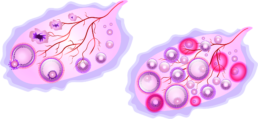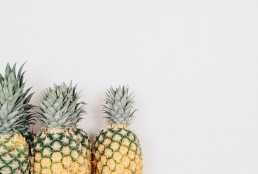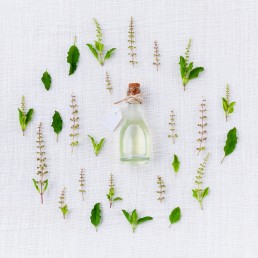The low-down on PCOS
WHAT IS IT?
Polycystic Ovaries Syndrome (PCOS) is the most common female disorder of the endocrine system. The symptoms can be varied but are connected by an underlying hormonal imbalance and almost always an excess of androgenic hormones. ‘Polycystic’ ovaries contain several small follicles which have not matured for ovulation, unlike regular ovarian follicles. These follicles are referred to as ‘cysts’ (though, confusingly, they are not actually cysts!) To add to the confusion, not everyone with PCOS has polycystic ovaries – and not everyone with polycystic ovaries has PCOS.
There are actually four different types of PCOS (I have an article dedicated to this):
- Adrenal PCOS
- Inflammatory PCOS
- Post-pill PCOS
- Insulin-resistant PCOS
HOW DO I KNOW IF I HAVE IT?
You need a doctor’s diagnosis to confirm PCOS. A doctor will usually run various blood tests (testosterone, Leuteinizing Hormone, Follicle-stimulating Hormone, prolactin, Thyroid-stimulating hormone, sex hormone-binging globulin) as well as pelvic ultrasounds to look for enlarged ovaries or ‘cysts’ on the follicles.
COMMON SYMPTOMS
- Irregular, absent or long menstrual cycles
- Anovulation (meaning ovulation doesn’t occur)
- Hirsutism (excess facial or body hair) or hair loss
- Difficulties managing weight
- Low mood and low self-esteem
- Acne
MISCONCEPTIONS
There are several common misconceptions with PCOS. The first is that it makes you infertile – or that you will struggle to get pregnant. Neither is necessarily true. Firstly, PCOS affects women differently, and secondly, it is usually the hormonal imbalance associated with PCOS that affects fertility – and the great news about that is that there is a lot that can be done through diet, lifestyle and supplements.
It is also often assumed that PCOS predominantly affects the ovaries but it actually affect the whole body, including the adrenals, digestion, insulin management and inflammation. This is why I take a holistic approach to PCOS clients – I look at the individual, their health history and their unique experience with the syndrome. We work together, step-by-step, to support the whole body using functional testing, diet and lifestyle changes and supplements.
NEXT UP: THE FOUR TYPES OF PCOS
How to improve your egg quality
Women are born with all the eggs they will ever have. If you think about it, if a pregnant woman is carrying a girl she is not only carrying her own baby but also all the eggs that might one day become her grandchild!
Some of my clients come to me with test results showing that they have low ovarian reserve, which indicates that there are few eggs. I like to remind these women that it only takes one good quality egg – and the good news is that there’s plenty you can do to improve yours. (N.B. let’s not forget the boys, the same is true for sperm!)
The importance of egg health is why I prefer to see clients at least 3 months prior to trying to conceive, or prior to assisted fertility treatments because it takes around 90 days for an egg to mature. That’s 90 days to give yourself the best possible chance.
My top five tips? Surprisingly simple!
- A diet high in protein such as lean meat and plant proteins, with limited dairy (if tolerated) and fish.
- Plenty of fats such as oily fish (twice weekly), extra virgin olive oil, avocadoes, nuts and seeds.
- Limit refined sugar.
- Try to reduce stress – though I appreciate this is easier said than done if you’re struggling to conceive! Try to add in some stress-relieving activities into your daily routine such as baths, yoga, meditation, being in nature – or whatever works for you.
- Limit caffeine and alcohol.
- Bonus tip – absolutely no smoking!
There are also several supplements I often use in clinic to specifically target egg quality but these will differ from woman to woman as everyone’s needs are slightly different. Please do get in touch if you’d like some personalised advice on how to support your fertility.
Why choose me over google?
There is a vast amount of information about nutrition available to us all but it can be overwhelming and very confusing. How do you know what to trust, whether or not it will work for you and what’s worth spending money on or what’s just a fad? How do you wade through the millions of opinions out there?
Who is giving the advice? You’d be surprised at how many big names in the health and wellness industry actually have no nutrition qualification. Or a qualification from a weekend course or part of a personal training programme, rather than YEARS of science-based nutrition studies.
The other thing to consider is that the internet does not know YOU.
- If you and I ate exactly the same thing for a month, we would not be in exactly the same state of health.
- If you and someone with exactly the same health symptoms as you ate exactly the same thing for a month, you still wouldn’t be in exactly the same state of health.
- If you and someone who weighed exactly the same as you, was exactly the same height, had exactly the same body fat percentage, activity levels ate exactly the same thing for a month, you STILL wouldn’t be in exactly the same state of health.
Why?
We have different lifestyles, activity levels, mental health, gut flora and genes.
All of these things mean that what you eat, and how you respond to foods, is unique to you and THAT is why Nutritional Therapy is a thing!
Influencers, personal trainers, your friends – none of these people are qualified to give YOU health advice (unless they actually are, of course!).
(Side note – recommending that people take supplements can be downright dangerous unless you know all the details about their health so PLEASE don’t buy supplements you’ve seen advertised on instagram).
So how am I different? (this involves a little bit of bragging but bear with me!)
Well firstly, I spent 4 years studying nutrition – and that’s after getting two degrees from Edinburgh and Yale and starting a PhD at Oxford in a totally unrelated field first! Basically, academic learning is my thing. Trawling through scientific evidence is a hobby. You can trust me to leave no stone unturned in researching your case – and to enjoy every second of it!
I’m also qualified and registered under two governing bodies (BANT, CNHC) which means I have to adhere to their rules, ethics and criteria. This includes continued education because nutrition is an evolving field. It also means that all your notes and our consultations together are confidential.
Secondly, if I had two clients with identical health goals, I guarantee you they would not walk away with the same generic plan.
- I spend 2 hours researching your specific case.
- I use science to support everything I recommend.
- I check, double-check and triple check that everything I recommend is safe.
- I find out what your symptoms are, in great depth.
- I find out what medication and other supplements you’re taking (if any).
- I find out what your family history is – are there any predisposing factors to consider?
- I find out what your lifestyle is like – how active are you? Who does the cooking in your house? Do you avoid certain foods for religious/cultural reasons? Do you have time to cook or do you need options readily available? Do you eat out a lot? Do you eat at home? Do you eat at the office?
- I find out what you like! This is SO important! I want to help, not make you miserable by telling you to eat a load of stuff you hate!
- I support you. My packages all include regular check-ins and email support.
- I work around you. Don’t have the budget for testing? No problem, we’ll work around it. Don’t want to take supplements? Fine – we can stick to food. Hate pills? That’s ok, I’ll find you a liquid alternative.
- I know my limits. Contrary to the popular saying – food is NOT medicine. Sometimes a client needs actual medicine, and care from someone who is medically trained. Sometimes a client needs a specialist. Sometimes a client needs a little extra support from a mental health professional. If I think you’d be better off in someone else’s hands I’ll help you to find someone more suitable.
The bottom line is that unlike the internet, I get to know you – and can recommend nutrition that is tailored entirely to you.
Still not convinced? Get in touch and let’s arrange a chat – free of charge and no obligation to book. laura@lmnutrition.co.uk
Tips for acne and breakouts
Acne and breakouts are not just a teenage phenomenon but affect many people later in life too – including me! With the potential to affect mental health as well, I really encourage anyone struggling with skin concerns to speak to a professional because there is often something that can be done to help. There is a lot more you can do with nutrition than I can explain in this blog post so please do get in touch if you’re struggling, or speak to a dermatologist or, of course, your GP.
My first tip is to find the root cause of your acne or breakouts. Is it hormonal? It is due to your digestive health? Is it an intolerance? Is it stress? The problem is that you can eat a ‘perfect’ diet but if you’ve still got imbalances going on at a cellular level, it’s going to be really hard to improve your skin.
Now onto the nutrition tips!
- Vegetables (yes, I know, this is my top tip for pretty much everything!)
Simple and effective. Eating more vegetables (aim for at least 7 80g portions each day) will increase the fibre in your diet, and fibre is essential for helping to bind up toxins that might otherwise find their way out through another detoxification organ… your skin! Acne and breakouts can often be linked to poor toxin elimination. Fibre is also fantastic for your gut bacteria – we’ll come to those guys a bit later. Veggies are also a fantastic source of anti-inflammatory compounds and antioxidants which help to limit damage to cells from free radicals and repair the skin.
- Don’t be afraid of fats.
Fats have been unfairly demonized but they are essential for skin health. Not only that – they are the building blocks for sex hormones such as oestrogen, progesterone and testosterone, as well as stress hormones like cortisol. Why is that important? A really common factor in acne and breakouts is an imbalance in hormones. Do you ever notice more blemishes around your period? Or breakouts when you’re in the middle of exams or a busy time at work? You can thank your hormones! Eating plenty of healthy fats can help to balance those pesky hormones – nuts and seeds, avocado, olive oil and oily fish (e.g. salmon, mackerel, anchovies, sardines, herring) are great sources.
- Balance your blood sugar levels.
Have you ever been told that chocolate causes spots? Well that’s not strictly true. Neither is the saying that sugar causes spots. What might cause them is imbalanced blood sugar (which admittedly can be caused by eating too much chocolate and sugar!) Three balanced meals each day, including some protein, some fats, some complex carbohydrates and plenty of vegetables is the simplest way to keep your levels balanced. Processed snacks (like biscuits, cake, crisps) and fizzy drinks other than water are likely to knock them out of balance. For some people, caffeine has that effect too.
- Look after your gut.
There is a scientifically proven link between your gut and skin. The bacteria in your gut can communicate and even influence your skin – meaning that if they’re not happy, it’s quite likely that it might show up on your face! On the other hand, a healthy gut flora can be anti-inflammatory, reducing signs of acne and breakouts. Prebiotics and probiotics are a great way to help the friendly strains of bacteria – but I always advise caution with these in anyone who has any gut symptoms as they can sometimes exacerbate them. Prebiotic foods feed the bacteria and include asparagus, onion, garlic, unripe bananas, Jerusalem artichoke. Probiotic foods contain live bacteria and include live yoghurt, kombucha, kefir, miso, natto, tempeh, sauerkraut and kimchi.
- Support your liver.
One causal factor involved in acne and breakouts – particularly later in life, can be an overburdened liver. The skin is a really important organ for detoxification so if you’re consuming a lot of toxins from your diet and environment your skin might well react. Examples of toxins are alcohol, excess caffeine, pollution, chemicals and fumes, pesticides, additives. There are certain supplements I often use to support the liver, but drinking plenty of water (see below) and eating plenty of bitters (e.g. watercress, rocket, dandelion, chicory) and cruciferous vegetables (e.g. broccoli, brussels sprouts, mustard greens) can support liver function too.
You’ve probably heard this one before but I can’t write a post about acne and breakouts without mentioning it! Keeping yourself well-hydrated should keep your skin well-hydrated – which means potentially less oil production. It is also essential for detoxification – see above.
Whilst these tips can be a useful starting point, supporting the imbalances that are at the heart of acne or breakouts are really the key to improving your skin. There are also some key nutrients that can be useful to take in supplement form short-term. Please do get in touch with me if you’d like to discuss your skin concerns – not only can I offer you some personalised nutrition support, I can also offer understanding because I have experience of these conditions myself. laura@lmnutrition.co.uk
The Game Changers
This is the Netflix documentary that everyone seems to be talking about. I have a lot of opinions on a lot of the documentary but I’ve narrowed them down to three key points:
- I’ve had several people tell me they’ve ‘gone vegan’ on account of the documentary – but this is where my first issue with it lies. The Game Changers consistently refers to a ‘plant-based’ diet without defining what that actually is. Newsflash – it’s not a vegan diet! A plant-based diet is one based predominantly on plants, but can also include all other food sources. We don’t actually know whether the athletes in the programme are strictly vegan, or if, for example, they’re also taking whey protein supplements which are based on dairy.
- The studies are ‘cherry-picked’ to display the desired results. Nothing in the documentary said anything positive about meat or fish consumption – yet there are a mountain of studies demonstrating the potential benefits, when consumed as part of a balanced diet.1, 2, 3, 4, 5 Let’s take the ‘cloudy blood’ study… it lasted 2 hours, was based on 3 people, didn’t account for what they’d eaten before the study, nor how long the effects lasted. Physiologically, fat in the blood is a normal effect of digestion.6Let’s also look at the wrestlers – I don’t think anyone would try to argue that eating steak twice a day is at all healthy or conducive to optimum performance! It’s an extreme example and not representative of the differences between a diet that includes meat versus a diet that does not. Another poor example is the athlete who eats KFC before a game – fried, poor quality chicken cannot be compared to high quality sources of animal products.
- The subjects are athletes who often have diets carefully constructed for them, like in the experiments shown on the documentary – those veggie burritos were a careful combination of plant protein, fat, carbohydrates and micronutrients. Many of the people now ‘going vegan’ do not have access to the same resources that professional athletes do and whilst a vegan diet can be healthy when carefully planned, it is likely to cause nutrient deficiencies if not done properly.7Despite what the documentary might lead you to believe, the scientific literature shows that vegans are at risk of deficiency of nutrients like vitamin B12, iron, vitamin D and omega 3 fatty acids, as well as protein – see my article on veganism for more details.7
The conclusion? In my opinion, the documentary is not based on accurate scientific evidence and I worry that it will inspire a lot of people to change their diets due to misleading information. I’m a great advocate for a plant-based diet, but if you are thinking of becoming a strict vegan I would encourage you to seek professional advice to ensure that you are getting adequate nutrition.
- Jacob, J., Peter, S. and Chopra, S. (2013). A fish a day, keeps the cardiologist away! - A review of the effect of omega-3 fatty acids in the cardiovascular system. Indian Journal of Endocrinology and Metabolism, 17(3), p.422.
- Tørris, C., Molin, M. and Småstuen, M. (2017). Lean Fish Consumption Is Associated with Beneficial Changes in the Metabolic Syndrome Components: A 13-Year Follow-Up Study from the Norwegian Tromsø Study. Nutrients, 9(3), p.247.
- Bowen, K., Harris, W. and Kris-Etherton, P. (2016). Omega-3 Fatty Acids and Cardiovascular Disease: Are There Benefits?. Current Treatment Options in Cardiovascular Medicine, 18(11).
- Li, D., Siriamornpun, S., Wahlqvist, M., Mann, N. and Sinclair, A. (2005). Lean meat and heart health. [ebook] Asia Pac J Clin Nutr, pp.113-119. Available at: http://apjcn.nhri.org.tw/server/APJCN/14/2/113.pdf [Accessed 11 Nov. 2019].
- Wyness, L. (2015). The role of red meat in the diet: nutrition and health benefits. Proceedings of the Nutrition Society, 75(3), pp.227-232.
- Iqbal, J. and Hussain, M. (2009). Intestinal lipid absorption. American Journal of Physiology-Endocrinology and Metabolism, 296(6), pp.E1183-E1194.
- Rogerson, D. (2017). Vegan diets: practical advice for athletes and exercisers. Journal of the International Society of Sports Nutrition, 14(1).





